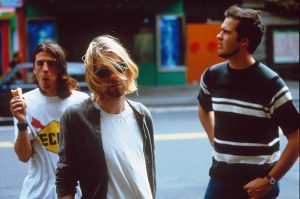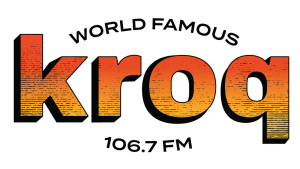MUSIC: It’s the End of the World Famous KROQ as We Know It
KROQ’s 2020 logo
The iconic Los Angeles station is on life support — and it has nothing to do with coronavirus.
.


A funny thing happened the week of March 8. Iconic Los Angeles radio station KROQ, long known for showcasing the top names in alternative rock, programmed a pop hit, Post Malone’s “Circles,” into power rotation. On March 1, the song hadn’t registered a single spin. Seven days later, it had 32 plays. By the end of March, it was averaging 65 a week — and over the last three months it has become the station’s second most-played track behind Billie Eilish’s “Everything I Wanted” and ahead of Shaed’s “Trampoline.”
Post’s arrival came amid several major exits for the station: longtime program director Kevin Weatherly, who left in late February after 28 years — on the heels of a proposed pay cut (in the ballpark of 30% according to an insider) — for a position at Spotify (he starts in September); and the March 18 firing of morning host Kevin Ryder after three decades on the job.
The decision to blow up the morning show brought severe consequences. In the past two months, according to Nielsen’s most recent L.A. report, KROQ has dropped more than a share point among listeners age 6 and up (from a 2.5 to a 1.4 share of the market) — placing the Entercom-owned station far behind its alternative rock competitor, iHeartRadio’s KYSR-FM Alt 98.7 (at a 2.2 share). What’s more, according to one metric, KROQ lost half of its listenership in the weeks following the decision to yank “Kevin the Morning with Allie & Jensen” off the air.

.


KROQ was changing and leading the charge was new brand manager Mike Kaplan — who not-so-coincidentally had been nicknamed “Mike the Show Killer” by jocks at his former station, the aforementioned Alt 98.7. According to sources, Kaplan ordered “Circles” be added to the playlist immediately and mandated that all talent no longer refer to the station as “K-Rock” but rather use its call letters — K-R-O-Q — almost exclusively. The very sound of the word “rock” purportedly offended Kaplan, who not only felt it antiquated, but borderline toxic. “Rock equals death,” says a station insider of management’s view.
“They’ve certainly gotten a lot more aggressive with new music since he’s taken over,” says one radio veteran of Kaplan. “There are a lot of new titles, which was an immediate shift from Weatherly, where [song] adds were notoriously slow.” Some of those playlist additions include Powfu’s “Coffee for Your Head (Death Bed)” with Beabadoobee, 24kGoldn’s “City of Angels,” Tame Impala’s “Lost In Yesterday” and Ashe’s “Moral of the Story.” “They’re really trying to freshen the sound,” adds the source, who suggests KROQ had in essence turned into a “classic alternative” station — leaning “on heritage artists,” and not claiming new acts like L.A.-based star Eilish for themselves.
Kaplan doesn’t deny any of the above — and even chuckles at his “killer” rep — though he does clarify the mandate to voice the station’s call-letters. “It’s used interchangeably,” he says. “Rock music is part of what we do, it’s part of alternative, but it’s not the only part of alternative. We’re not just looking to play four white dudes in a band. Our audience is as diverse as ever and our playlist needs to be too. Whether it’s Billie Eilish or Lana Del Rey or rappers making alternative tracks such as 24kGoldn and Dominic Fike, we’re bringing together what millennials and Gen Z fans want. There are really no boundaries when you think about music today. We’re not a singular focus where we get so pigeon-holed and lack diverse options. We don’t just stand for one thing. It’s a lifestyle and an attitude.”
.
 KROQ’s 2020 logo
KROQ’s 2020 logo
So what of SoCal standbys like Red Hot Chili Peppers, Foo Fighters and Sublime? A look at the most played songs on KROQ for 12 weeks (Feb. 16 to May 3) finds the Chilis’ first entry, “Dani California,” comes in at No. 42; No. 65 for the Foos’ “The Pretender”; and (gasp) No. 124 for Sublime’s “Santeria,” the very sound of sunshine, surf and smoke in better times. Nirvana’s “Come As You Are,” a staple of the station if ever there was one, sat at 94, having dropped 60% in plays over the same 12-week period. (Ironically, Post Malone played a livestream concert on April 24 to some 10 million YouTube viewers that consisted of 75 minutes of Nirvana songs; he also pointed to the Nirvana-inspired tattoo that adorns his face and reads “Stay Away.” No doubt a young Post would have been a KROQ listener.)
Kaplan says artists like The Cure or Depeche Mode, KROQ mainstays from the pre-grunge years, can be found on sister KCBS-FM (“Jack-FM”). Acts like Blink 182, Weezer and Green Day, which are played on Alt 98.7 though with less frequency, “will certainly be part of the fabric of who we are for a while,” he says. “But others have taken that step to a different format and for a different target consumer.”
“Listeners absolutely expect rock to be a significant sound on the station,” counters one former staffer, a view with which Weatherly agrees. “Over the last five to 10 years, the appetite for new alternative music with our core audience was not as strong as it had been previously,” he tells Variety. “There have not been as many big hits that have stuck around. … I wish we could play as much new music as possible, but that was not what our audience said that they wanted. Alternative has been leaning more pop and the expectations from our audience were more rock leaning. … The artists that consistently perform the best were Foo Fighters, Linkin Park, Muse, Killers, Green Day.”
Still, KROQ’s on-air staff frequently grumbled about having to play “the same 90 songs” and the audience seemed game for a change too. But then came the decision to pull the plug on “Kevin in the Morning” during the early days of the COVID-19 stay-at-home quarantine. It left listeners who had formed a deep attachment over 30 years of “Kevin & Bean” without a familiar routine that would have mattered even more these days, and wound up demoralizing the staff that was left behind.
The reaction from KROQ’s most loyal audience was swift. Two months later, the station is still constantly deleting angry comments on its social media posts (particularly on Facebook), while listeners en masse write how they’ve stopped tuning in. “I have not listened even one minute after that and I have removed my pre-sets,” wrote one former fan — and that’s a tame example. Most are much more explicit — and not hiding their anger at both station management and owner Entercom.
“Many of these people on social media, they haven’t listened to KROQ in years,” says Kaplan defensively. “They just wanted to glom on.”
Entercom regional president Jeff Federman, whose oversight includes KROQ, says he felt the need to immediately yank “Kevin in the Morning” off the air, despite the expected backlash. “We’ve done a lot of research, a lot of strategy meetings around all of this,” he says. “So it wasn’t like this knee jerk, ‘Hey it’s the pandemic, no one will see it happen’ decision.” The station is now, more or less, retroactively proclaiming that the show died once co-host Gene “Bean” Baxter left.
.
.


(“Kevin and Bean” ended its run at the end of 2019, after Baxter moved to London. “Kevin in the Morning” was relaunched with Ryder at the helm, but multiple insiders share that Ryder’s contract was set to expire this November — and there was the very real possibility that the show may have ended after that, particularly with Entercom in severe cost-cutting mode.)
Federman miscalculated Ryder’s reaction, however, and says he assumed the 30-year KROQ vet would willingly agree to quickly segue to another assignment inside Entercom despite the jolting transition. “I really thought we were going to be able to take his career into a whole other orbit by moving him into podcasting,” he says.
Instead, a stunned Ryder gave a quick on-air goodbye, expressing his disappointment with how the end of the show was handled. “I’m truly baffled by KROQ’s cold, heartless attitude toward the people who built this station,” he said on air. “They’ll say it’s just business, but for a long time, it wasn’t. For a long time, it was family and no business.”
Because of the abrupt cancellation, KROQ listeners were alienated, and replacement show “Stryker & Klein” was forced to try and clean up the mess — and win back those fans who had kissed off KROQ for good.
“Things happen and people get upset,” adds Federman. “We certainly hope to win back people that have left us. We expected the ratings hit. You can’t pull off someone of Kevin’s stature and not take some sort of hit. And we knew that. It was a tough call to make, but one that we felt was necessary.”
Now, more than two months after firing Ryder, Mac Kay, Jensen Karp, producer Dave Sanchez and some of the show’s hourly support staff, KROQ is still in damage control mode. “There were 400 other ways to do it,” Karp says. “I think they just picked the worst way.”
Indeed, KROQ could have taken much of 2020 to celebrate the 30-year legacy of Ryder’s run — and perhaps even have reunited him with longtime partner Bean for a true farewell. KROQ’s sales team could have signed up sponsors and monetized it as an end of an era event. And management could have capitalized on the pomp and circumstance to spin a proper passing of the baton to new morning show “Stryker & Klein.”
“Kevin [Ryder] made this point on his way out: You always felt over there like you were completely expendable,” offers former “Kevin & Bean” star Ralph Garman, who was let go by KROQ at the end of 2017, soon after Entercom had purchased CBS Radio. “They never really seemed to appreciate that they had lightning in a bottle. I guess, like most of show business, they felt people were aging out. I understand that you do periodically need to inject new blood into a show or a station or a format. But the more corporate it got, the more decisions were being made by accountants and lawyers, the less successful the station became.”
“No one had a better term for it than Kevin Weatherly,” says former KROQ staffer Jay Tilles, who spent several years as producer on “Kevin & Bean” before heading up the station’s digital operations. “He foresaw this and said it wouldn’t happen overnight. KROQ would succumb to death by a thousand cuts.” (Weatherly does not recall the specific remark.)
In fact, KROQ’s buckle was a decade-long decline. It can be attributed to uncertainty in the radio business, which has seen its audience pivot to streaming platforms, podcasts, satellite radio and other forms of audio entertainment, and a splintering of the alternative rock format, where guitar-based groups of the ’90s and early-aughts are in a sort of format purgatory, not entirely at home on classic or modern rock. Some of it was also self-inflicted.
Says Kaplan: “Since 2013, the ratings were challenged.” Federman is less diplomatic about it, calling the slump “excruciating.” Coincidentally, that was around the time that KROQ also began to make on-air personality changes — including booting longtime “Kevin & Bean” traffic reporter Lisa May, which prompted major backlash. (Something that Garman’s exit in 2017 also triggered. Both times, the ratings took a hit.)
Veteran radio and film exec Don Barrett, who has chronicled the L.A. radio market for nearly two decades on his website LARadio.com, says that “someone took their eye off the ball. Piece by piece, the station was dismantled with no real innovation to replace the changes with compelling programming. Habits in morning drive are tough to change… The public firings over the years were unsettling to many. Kevin & Bean ruled the roost for decades. It takes a long time to build a new morning show. Replacements can be as talented as those they replace, but it still takes time to build familiarity, acceptance and trust.”
.


* * *
The station’s slogan, “The World Famous KROQ,” was originally coined as a joke — Tilles believes, by legendary KROQ jock Freddy Snakeskin. A low-watt FM station out of Pasadena that played punk rock and new wave but could barely stay on the air through the 1970s, by the early 1980s, the station’s “Roq of the 80s” format had caught on. With famed disc jockey Rodney Bingenheimer introducing the likes of the Ramones, Blondie, the Runaways and the Go-Go’s, soon bands from the U.K. knew this L.A. radio station could turn them into stars. (More recently, KROQ championed bands like Coldplay — Chris Martin even performed at Weatherly’s farewell party in March.)
By 1986, the station truly was “World Famous,” so much so that Mel Karmazin’s Infinity Broadcasting purchased KROQ for a then-record $45 million. Infinity merged with CBS in 1997 to become CBS Radio, which owned the station until being acquired by Entercom in a deal approved November 2017. Along the way, KROQ made future TV stars of such alums as Jimmy Kimmel, Carson Daly, Adam Carolla and Dr. Drew Pinsky.
. Nirvana – Dave Grohl, Kurt Cobain and Krist NovoselicStephen Sweet/Shutterstock
Nirvana – Dave Grohl, Kurt Cobain and Krist NovoselicStephen Sweet/Shutterstock
In the 1990s came the peak of the alternative music format thanks to the success of bands like Nirvana and Smashing Pumpkins. KROQ became one of the nation’s top-billing stations (as high as $68 million in 2005), and a model for alternative radio across the country. By the 2000s, KROQ had climbed to the pinnacle of L.A.’s radio ratings, and as recently as six years ago, “Kevin & Bean” was still the No. 1 morning show in Los Angeles.
Even Federman recalls the time in his youth when KROQ was a genre unto itself. “Growing up, I would walk into Tower Records and say, ‘Where’s the KROQ section?’,” he says. “That’s because we owned the music.”
“You put on KROQ because you wanted to hear something different,” says one longtime label executive. “It’s hard to stay edgy and cool. Now someone’s gotta take the baton and be adventurous and get back to whatever that is. You have to dare to be different.”
Daniel Glass, CEO of Glassnote Records, home to alternative perennials Mumford & Sons and Phoenix, puts it this way: “The best DJs in the world are those who aren’t afraid to clear the dance floor.”
But with money came the need to play it safe and not alienate that audience. “That’s the problem, you’re beholden to the ratings and you notch it down,” Tilles adds. “You’re now billing so much more money, your ratings are higher and you don’t want to go backward. And so every year more time was spent poring over the numbers. The music and morning show was researched to death. That’s why you hear Red Hot Chili Peppers on KROQ all the time. Because Chili Peppers is familiar. In a world of music and radio, you want familiarity and likability.”
As the KROQ audience aged, it faced a bit of a Catch-22: Attempt to stay relevant to younger audiences but potentially alienate that core listenership? Or stick with the guaranteed older audience, and lose out on the next generation? And, most importantly, can your sales staff monetize the demographic?
“The station has always had this debate,” Tilles says. “Keeping the older demo has its upside. They have more discretionary income, which is great for advertisers, and they’re far more loyal to radio. But over time this demo will diminish and if you haven’t backfilled with new, young listeners, the ratings will suffer. If you bite the bullet and play young, polarizing, trendy music, you can jettison the older listeners in favor of a younger audience. But the irony of the latter plan is that younger people are less inclined to listen to terrestrial radio. So in the end, you’re stuck with an older audience and more Red Hot Chili Peppers.”
Garman, who now hosts the daily morning show-style podcast “The Ralph Report,” says it seemed to him that the station managed to make all the wrong choices. “I remember Kevin Weatherly saying to us, ‘it’s really important for us to play more music and you guys are talking too long,’” he says. “This was at a time where streaming was blowing up, and Spotify and iTunes, and we kept saying, people can get music almost anywhere now. The best thing that terrestrial radio had to offer and I believe still does was personality driven content.”
Weatherly disputes that, however. “The old debate of more music, more talk, more music, more talk, that’s been going on forever,” he says. “I am obviously pro-personality. I brought in Jimmy Kimmel, Carson Daly, Stryker, Nicole Alvarez and Kat Corbett and recently put Klein on in the afternoon with Stryker, because that was a point of differentiation. If everyone’s playing the same music, what sets us apart? Personality? That’s the difference maker.”
Weatherly, who is credited with the 1990s success of KROQ, also constructed the huge popularity of adult hits Jack-FM — which has never had disc jockeys. But in applying the success of Jack to KROQ, insiders believe he may have stripped the station of its personality. And as Weatherly expanded his oversight inside CBS Radio (including KROQ, Jack and Amp), one insider says he became “completely checked out” when it came to KROQ.
“I don’t completely disagree with that, because there were probably some times when I was spread too thin,” says Weatherly. “I was trying to do the best that I could for all three radio stations.”
And that’s when iHeart smelled blood. After years of trying — but failing — at launching a competitor to KROQ, iHeart finally pulled it off by flipping its 98.7 FM signal, which had previously housed the softer alternative “Star” format, into a more aggressive rival. The renamed “Alt 98.7” also picked up steam in the mornings with “The Woody Show,” which particularly benefited from every time KROQ mishandled another exit on “Kevin & Bean.”
Under Kaplan, Alt 98.7 aimed to siphon away Millennial listeners with personalities like “Woody.” It worked.
“They started playing the exact same music,” Federman says of the competition. “And that became a problem. It wasn’t exclusive. We did a ton of research, we knew that we had to do something. And that something was: either decide if we were going to lean more towards 25-54 or push forward and play new music, which is really what the essence of the KROQ brand is. The research really showed us that we needed to start moving forward.”
Of his own influence on Alt when he was program director from 2013 to 2018, Kaplan adds that musically, “KROQ was behind the times a little bit.” But what it had, he says, was a brand. “Across the street, they have nothing,” he says of his former employer, catching himself. “They have, you know, a little bit right now, but the power of the KROQ name is just incredible. And we can bring it back.” (Worth noting: the current PD of Alt 98.7 is Lisa Worden, who worked at KROQ from 1995 to 2017, helping Weatherly build the station into a monster. She hopped to iHeart as its alternative rock brand manager, and took over KYSR, in 2017.)
That same formula applied to New York’s WXRK when it pivoted to the Alt format, another notch in Kaplan’s belt. Once gaining oversight of KROQ, the executive put into action a plan for both stations to mirror each other’s playlists — an unorthodox move, say industry observers. Kaplan acknowledges that the history of alternative in New York doesn’t have the depth that the format claims in Southern California, but in his view: “We’re not seeing a lot of regional hits so to speak anymore, because things are so omnipresent. … Whether it’s an artist breaking out of TikTok or suburbia, we’ve got to be on the pulse for that and be as inclusive and diversified as the audience and the artists are today.”
Of course, the status quo went out the window the day the COVID-19 pandemic became a SoCal problem. And ironically, it’s during those times that area residents look to local stations to get informed and feel connected. That’s been reflected in overall consumption of radio over the last three months. According to a recent study by Havas, 34% of respondents said their radio consumption increased. More telling: that number was 40% among those 25 to 34.
At the same time, the station has had to rely on specialty programming — like the recent top 106 songs of the 2000s — due to the lack of events, giveaways or its own branded concerts. Under normal circumstances, KROQ would have aired two weekends of Coachella programming in April and gone into announcements and giveaways for its annual Weenie Roast, which would have been held in May.
Asked who he thinks the KROQ audience is, Federman curiously answers who it should be. “The KROQ audience should be about 28-29 years old and ethnically diverse,” says the L.A. native whose business background is in sales and dotcoms (mostly failed, by his own admission). “And should be leaning towards new music. They should be the person that’s at Coachella checking out all the new music tents and not just sitting in front of the main stage to hear the big artists. They are very musically driven. They’re coming to us for entertainment.”
.


Barrett notes that Entercom has more challenges than KROQ. The company owns around 235 radio stations, facing similar challenges in virtually every market. In Los Angeles (the No. 2 market in the U.S. but the top revenue generator), Entercom’s classic hits station KRTH-FM (“K-Earth 101”) continues to do well by targeting an older demographic. Insiders say the company is seriously mulling a flip to sports talk for top 40 “Amp,” although Federman denies this.
“The economic challenges for all of radio seems daunting,” Barrett says. “Maybe trying to manage a half dozen stations in Los Angeles is just too much to ask of anyone. Everyone probably needs to step back, swallow hard, and concentrate on the stations that deserve to be saved.”
For KROQ, Federman and Kaplan express optimism that they can create a new legacy for the station, and perhaps live up to that “World Famous” moniker again. Federman says he would ideally like to see the station do a better job catering to L.A.’s diverse makeup. To that end, the station is launching “Alternalido,” a Sunday night show focused on Latin Alternative music, hosted by KCRW DJ Anthony Valadez. The station is also committed to Stryker & Klein, and plans to add more players to that show shortly.
Will it work? “I’ve predicted KROQ will eventually go Spanish, or talk for a long time,” Baxter wrote in a recent Tweet. “I just don’t see how the Los Angeles market can support so many rock stations. And KROQ is the most niche, and with the worst signal too. Still, I wish them well.”
Los Angeles has seen plenty of legendary radio stations come and go over the years, with call letters like KHJ, KFWB and KMET. In other markets, legacy alternative stations are already long gone, such as New York’s WLIR. Garman, for one, has made peace with the idea that his former employer isn’t what it once was.
“I think everything has a natural life to it, right? And KROQ became the man,” he says. “They became this traditional station because they simply had been around so long. There may be just a natural shelf life for anything: A TV show, a radio show, a station. Some of it may have been unavoidable. But I think they certainly facilitated the end coming quicker than it needed to by making some poor management choices.”
.


KROQ’s 30 most played songs (March 1 to May 17)
Source: Mediabase
BILLIE EILISH everything i wanted
POWFU Coffee For Your Head
POST MALONE Circles
24KGOLDN City Of Angels
TAME IMPALA Lost In Yesterday
ASHE Moral Of The Story
GROUPLOVE Deleter
AJR Bang!
TWENTY ONE PILOTS Level Of Concern
GLASS ANIMALS Your Love (Deja Vu)
KILLERS Caution
SHAED Trampoline
LOVELYTHEBAND Loneliness For Love
ABSOFACTO Dissolve
KENNYHOOPLA How Will I Rest In Peace If…
CAGE THE ELEPHANT Social Cues
LOVELYTHEBAND Broken
JOJI Run
THE 1975 Somebody Else
TWENTY ONE PILOTS The Hype
DAN LUKE AND THE RAID Fool
INTERRUPTERS She’s Kerosene
THE 1975 Me & You Together Song
MEG MYERS Running Up That Hill
MATT MAESON Hallucinogenics
DOMINIC FIKE 3 Nights
FOSTER THE PEOPLE Sit Next To Me
MGK why are you here
GUARDIN alive
PANIC! AT THE DISCO High Hopes
With additional reporting by Roy Trakin
.


SIGN UP TO RECEIVE OUR EMAIL
The most important news of the day about the ASEAN Countries and the world in one email: [email protected]










